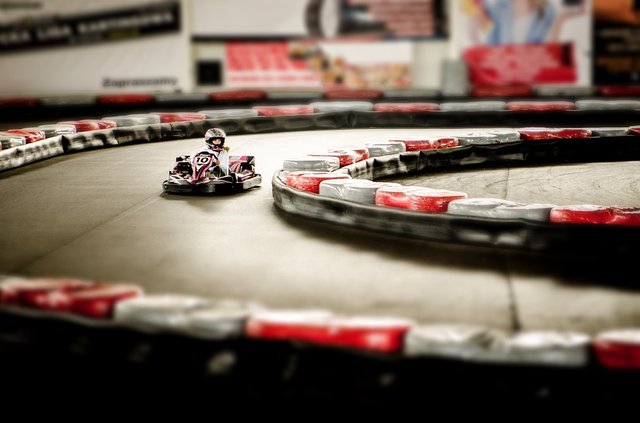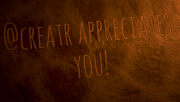Thank you for checking out the mini fiction writing workshop, a regular series providing small, digestible tips for writing fiction. If you're a developing writer, hopefully you will find some useful information.
This workshop is about starting a story. There is no one right way, obviously, but there are some do's and don'ts. For example, as I mentioned in a recent workshop ("Must your character do that?"), one well known piece of wisdom is that you don't want to start a story with your character waking up. Why? Well there are a number of reasons, but when you think about it, it's just not that interesting.
Let's explore this!

Image source: Pixabay image by Jarmoluk
What is the beginning?
There are many approaches to starting a story, and as I said there is no one right way. So, why is it so hard?
One reason, I believe, is that we don't know whether to start at the beginning. And what is the beginning, actually?
For example, look at the picture of the child in the go-kart. I'm not sure if it's a girl or a boy. Let's just say it's a girl. Perhaps she's going to be in a racing competition. Here are some possible ways to start the story:
- She talks with her mother about the big race day over breakfast.
- She suits up and gets into her kart.
- The race official signals for the karts to go.
- She dreams of racing at the age of 5, and spends another 7 years moving toward that dream.
The job of a story's opening lines
The opening lines of a story must grab the reader.There are many temptations when we think about writing the opening lines.
- We could provide some background into why our character wants to race.
- We could set the scene with lots of information about the sights and sounds, and the demeanor of the officials and the audience.
- We could dive into the background of the character's relationship with her mother, and why the character feels defiant.
In the beginning we (readers) don't care about the character's background. We want to see something interesting happening to the character right now. If we don't connect with a character on an emotional level, right away, the background does not matter.
Getting the reader involved in the story and emotionally connected with the characters is absolutely paramount. Your opening sentences must achieve this goal quickly, or you lose the reader. There are far too many things competing for that person's time and attention.
The beginning must be compelling
So, how do you grab a reader's attention? That is the million dollar question, of course. But if there was a specific formula, it might look something like this:
- Setting + character identification + action + conflict
Jenny suited up amidst the hum of kart engines. Her trainer smiled at her from the bleachers and raised a thumb. Were those tears in her eyes? She scanned the audience quickly. Thank God. Her mother had not come.So, let's break that down:
- Setting: We know we're at a go-kart race track because of the hum or kart engines.
- Character identification: We know the driver is named Jenny, and that she is aware of her trainer and wary of her mother.
- Action: She is suiting up for an imminent race.
- Conflict: We know there is something going on between Jenny and her mother. But we don't know what.
Don't get stuck at the beginning
All that said, don't get hung up on trying to write the perfect, most compelling line before you get started writing your story. You could spend days working on your opening lines only to throw them all out later when the story evolves.My recommendation is to start your story directly in or just before the main action. Don't worry about perfecting it. If the first few lines don't have the zing you're looking for, you can go back and work on them later, when you have really immersed in your story and have gotten to know your character(s).
So, just do it. Start writing. Create some action and enough information to help us visualize the scene. You will most likely find that your story takes shape as you write, and the opening lines will come.
Thanks for reading!
Join our weekly workshop
Want to work with writers and editors to improve your writing? Join me for a weekly fiction writing workshop at Steemhouse Community on Discord.
The writing workshop collection
You can browse my entire collection of writing workshop posts in the links below.
Mini workshop series
Short posts on specific writing topics:
- Mini writing workshop: What is magical realism? (Exploring the magical realism genre)
- Mini writing workshop: Should you write in present tense or past tense?
- Mini writing workshop: Must your character do that? (About writing tics and character pet peeves)
- Mini writing workshop: What's it all about? (About story lines)
- Mini writing workshop: Must we fight? (About conflict in fiction writing)
- Mini writing workshop: What's the point? (About making things happen)
- Mini writing workshop: What prompted that? (About writing from prompts)
- Mini writing workshop: Who said that? (Tips for writing dialog)
Mini workshops in 50-word prompt posts
Brief workshops, typically 3-5 paragraphs, at the top of 50-word short story challenge posts:- Mini writing workshop on "tense"
- Mini writing workshop on the editing process (with a walkthrough example)
- Mini writing workshop on taking time to write
- Mini writing workshop on the power of editing
- Mini writing workshop on critique
- Mini writing workshop on fixing punctuation errors
- Mini writing workshop on mainstream publishing (with a resource for 50-word story authors)
- Mini writing workshop on voice and language (as compared to the importance of plot)
- Mini writing workshop about becoming a great writer
- Mini writing workshop on contests and challenges
- Mini writing workshop on what makes a story a story
- Mini writing workshop on demystifying story writing
- Mini writing workshop on 50-word short story writing process
- Mini writing workshop on the steps for writing 50-word stories
- Mini writing workshop on micro-fiction and writing succinctly
- Mini writing workshop on the "why" of writing
- Mini writing workshop on the challenge of micro-fiction
In-depth workshop posts
The original writing workshop series:- Writing workshop volume 1: The beginning
- Writing workshop volume 2: Exploring voice in writing
- Writing workshop volume 3: Say what you want to say
- Writing workshop volume 4: Serial fiction projects on Steemit
- Writing workshop volume 5: Getting organized and actually writing
- Writing workshop volume 6: Tips for writing anywhere, anytime
- Writing workshop volume 7: Should you write historical fiction?
- Writing workshop volume 8: Prompts, contests and challenges - oh my!
- Writing workshop volume 9: Pushing through insecurity and writing anyway
- Writing workshop volume 10: Perspective and POV in fiction writing
- Writing workshop volume 11: Second person point of view in fiction
- Writing workshop volume 12: How to write your character's background
- Writing workshop volume 13: What to do with all these voices in my head?
- Writing workshop volume 14: Write your story from a logline
- Writing workshop volume 15: Three tips for improving your fiction
- Writing workshop volume 16: How to accept criticism on your fiction writing
Note: The image is sourced from Pixabay.

Posted from my blog with SteemPress : https://jaynalocke.com/2019/02/10/mini-writing-workshop-how-do-you-start-a-story/
This post was shared in the Curation Collective Discord community for curators, and upvoted and resteemed by the @c-squared community account after manual review.
@c-squared runs a community witness. Please consider using one of your witness votes on us here
Downvoting a post can decrease pending rewards and make it less visible. Common reasons:
Submit
Shared and saved.
It is hard to start a story and to be honest I am seldom teased to read more, I force myself to read on and hope it will get better, unless the first 300 out of 500 sites are boring.
Am I easily bored or?
Posted using Partiko Android
Downvoting a post can decrease pending rewards and make it less visible. Common reasons:
Submit
Ha ha, well I think everyone is these days. We have so many things vying for our attention! We writers need to make the very begging of our stories attention-grabbing for that reason!
Posted using Partiko iOS
Downvoting a post can decrease pending rewards and make it less visible. Common reasons:
Submit
Congratulations @jayna! You have completed the following achievement on the Steem blockchain and have been rewarded with new badge(s) :
Click here to view your Board
If you no longer want to receive notifications, reply to this comment with the word
STOPTo support your work, I also upvoted your post!
Downvoting a post can decrease pending rewards and make it less visible. Common reasons:
Submit
Thanks for this extra pack on new energy to write my stories.
Posted using Partiko iOS
Downvoting a post can decrease pending rewards and make it less visible. Common reasons:
Submit
Thanks so much for stopping by, @detlev. I'm glad you found it useful! Good to see you.
Downvoting a post can decrease pending rewards and make it less visible. Common reasons:
Submit
Hey, hope you are having a nice day!
We stopped by to invite you to participate in the "Caption this photo" and "Finish this story" contests and win prizes worth 12 Steem!
Also check out 1Ramp on Android and Web.
Downvoting a post can decrease pending rewards and make it less visible. Common reasons:
Submit
Thank you. Scooped some information with me😊
Downvoting a post can decrease pending rewards and make it less visible. Common reasons:
Submit
Great. Thank you for your comment, @wems!
Downvoting a post can decrease pending rewards and make it less visible. Common reasons:
Submit
Love your workshops! Every one improves my writing knowledge.
Downvoting a post can decrease pending rewards and make it less visible. Common reasons:
Submit
I’m so glad you find them useful! See you in the Steemhouse Community workshop. 😁
Posted using Partiko iOS
Downvoting a post can decrease pending rewards and make it less visible. Common reasons:
Submit
Thank you for writing this up and posting it. It's useful to find this kind of information online. Everyone can use to learn more about their craft and I'm happy to have found this.
Downvoting a post can decrease pending rewards and make it less visible. Common reasons:
Submit
Thanks for your kind comment, @tabyington. I’m so glad you were inspired by my post!
Posted using Partiko iOS
Downvoting a post can decrease pending rewards and make it less visible. Common reasons:
Submit
Great advice here, Jayna...
Thanks for this series.
😄😇😄

Downvoting a post can decrease pending rewards and make it less visible. Common reasons:
Submit